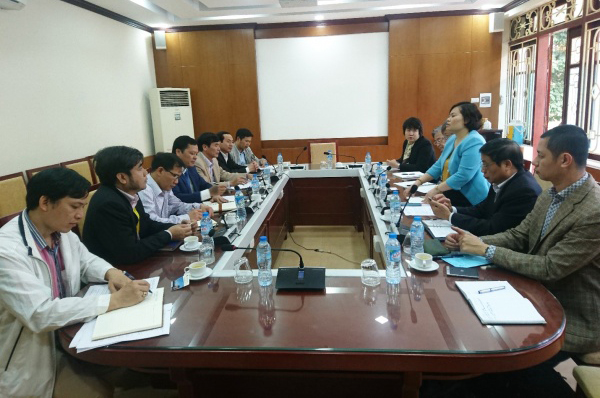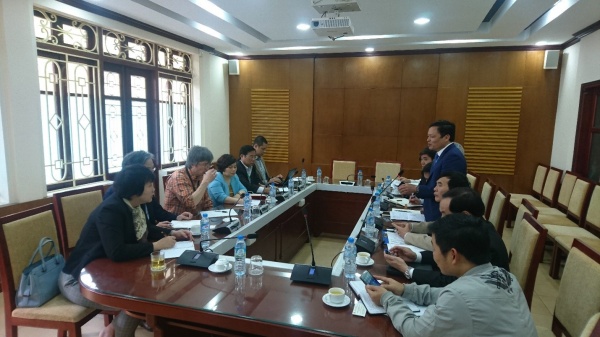Cooperation Program in animal production and large animal insurance
Updated on 08:54, Thursday, 29/03/2018 (GMT+7)
Within the framework of the international cooperation between the strong research group Rural Management and Development led by Assoc. Prof. Dr. Nguyen Thi Minh Hien, Faculty of Economics and Rural Development, VNUA, and Obihiro University of Agriculture and Veterinary Medicine (Japan), on March 2nd, 2018, Prof. Yasushi Sembokuya and Prof. Kanayama Toshihisa visited Vietnam and worked with the VNU
Within the framework of the international cooperation between the strong research group Rural Management and Development led by Assoc. Prof. Dr. Nguyen Thi Minh Hien, Faculty of Economics and Rural Development, VNUA, and Obihiro University of Agriculture and Veterinary Medicine (Japan), on March 2nd, 2018, Prof. Yasushi Sembokuya and Prof. Kanayama Toshihisa visited Vietnam and worked with the VNUA’s research group and the Department of Agriculture and Rural Development of Hanoi province. The objective of this working visit was to examine the issues in large animal production, especially dairy cows, thereby developing programs for supporting the participation in dairy cattle insurance for households and farms.

Assoc. Prof. Dr. Nguyen Thi Minh Hien – Vice Dean of the Faculty of Economics and Rural Development
– Leader of the strong research group – Rural Management and Development spoke at the meeting
At the meeting, Mr. Ta Van Tuong – the Vice Deputy of the Department of Agriculture and Rural Development of Hanoi province said: Despite being a special administrative division (the capital of the country), Hanoi has the largest agricultural production in the country. As for dairy farming, the province is ranked third in terms of the total number of dairy cows (in 15 target communes). The main feature of Hanoi’s dairy production is small-scale, scattered production, which results in pollution because farmers do not follow the production process, creating management challenges. Therefore, the overall development trend would be large scale, concentrated production. Currently, in order to develop this sector in addition to the local dairy enterprises, the city is attracting some large firms such as TH-TrueMilk company and VinaMilk company to meet local demand and to supply products to the other markets.

Mr Ta Van Tuong- Vice Deputy of the Department of Agriculture and Rural Development of Hanoi province
Dr. Su Thanh Long, a specialist in large animal obstetrics and a lecturer at the Vietnam National University of Agriculture added that: “In the world, the dairy sector only develops when the number of companies reduces and the number of cows increases. The main reason why Hanoi does not carry out diary production insurance at the moment is that the farmers only produce at small scale, do not follow any specific procedures, and sometimes break the contracts with the purchasers, which makes it more risky for insurance companies to provide insurance service for the dairy sector. As the technicians, we are providing consultation to Hanoi and developing the procedures not only to control veterinarians (to prevent and treat diseases) but also to reduce the number of farming households by increasing the number of cattle per household. When the procedures are properly applied, insurance companies will provide services for this market.”
Japanese specialists also shared how Japanese agriculture operates as well as how they balance supply and demand of agricultural products in the market. The dairy insurance experience in Japan is desirable for Hanoi in the near future.